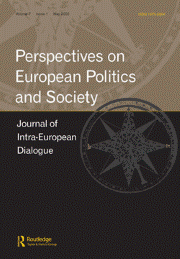 What lessons can we learn from the failure of the Constitutional Treaty for EU constituent policy making? Which of the alternative readings are accurate, on what assumptions are they based and how 'sound' are they in the light of empirical research? These are some of the key questions that drive the international research project, ConstEPS. It looks at the political variables that are overlooked by technocratic approaches to European governance: The daily public debates, communicative actions and interactions and the patterns and dynamics of conflict and consent. This special issue of Perspectives on European Politics and Society contributes to developing this new research field by exploring EU constitutional politics from the perspective of media debates in member states. The case studies of public debates on the European Constitutional Treaty in six new and old EU member states that are included in this volume share a common theoretical and comparative framework and empirical methodology. They seek to make contributions at three levels, namely at the levels of theory, empirical data, and methods of media discourse analysis.
What lessons can we learn from the failure of the Constitutional Treaty for EU constituent policy making? Which of the alternative readings are accurate, on what assumptions are they based and how 'sound' are they in the light of empirical research? These are some of the key questions that drive the international research project, ConstEPS. It looks at the political variables that are overlooked by technocratic approaches to European governance: The daily public debates, communicative actions and interactions and the patterns and dynamics of conflict and consent. This special issue of Perspectives on European Politics and Society contributes to developing this new research field by exploring EU constitutional politics from the perspective of media debates in member states. The case studies of public debates on the European Constitutional Treaty in six new and old EU member states that are included in this volume share a common theoretical and comparative framework and empirical methodology. They seek to make contributions at three levels, namely at the levels of theory, empirical data, and methods of media discourse analysis.
The research team has constructed a cross-national and longitudinal data set on public discourses about European constitutionalisation. The empirical data set includes 7,378 articles from 31 print media, all of which cover the political debates in six new and old member states during the Constitutional Treaty ratification, rejection and reflection (October 2004 - October 2005). In the introduction to the volume, Liebert highlights a number of comparative findings that correct popular misconceptions about why the Constitutional Treaty failed and help to determine to what degree text, process and context are to blame for this.
Contents:
Liebert, Ulrike: ‘Introduction: Structuring Political Conflict about Europe: National Media in Transnational Discourse Analysis’, pp. 235-60.
Maatsch, Sönke: ‘The Struggle to Control Meanings: The French Debate on the European Constitution in the Mass Media’, pp. 261-80.
Packham, Kathrin: ‘From the Contenious Constitution to the Awkward Other … Social Model: The Constitutional Debate in the British Print Media’, pp. 281-313.
Wyrozumska, Alexandra: ‘Who is Willing to Die for the Constitution? The National Debate on the Constitutional Treaty in Poland’, pp. 314-41.
Rakušanová, Petra: ‘The Constitutional Debate: A One Man Show? Vaclav Klaus and the Constitutional Discourse in the Czech Republic’, pp. 342-73.
Evas, Tatjana: ‘Elitist with a Russian Twist: Mass Media Discourses on European Constitutional Ratification in Estonia and Latvia’, pp. 374-413.
This special issue has grown out of an international research project ConstEPS – Constituting Europe, Citizenship and the Public Sphere, based at the University of Bremen, Jean Monnet Centre for European Studies (CEuS) and directed by Ulrike Liebert. The project is funded by Volkswagen Foundation as part of the research program 'Diversity in Unity? Foundations and Conditions for an Enlarged Europe (2005 – 2008, No. 2/80 36).
Full info
Europe in Contention: Debating the Constitutional Treaty
Special Issue of the Perspectives on European Politics and Society, Vol. 8, Issue 3, 2007
Edited by Ulrike Liebert, CEuS, University of Bremen